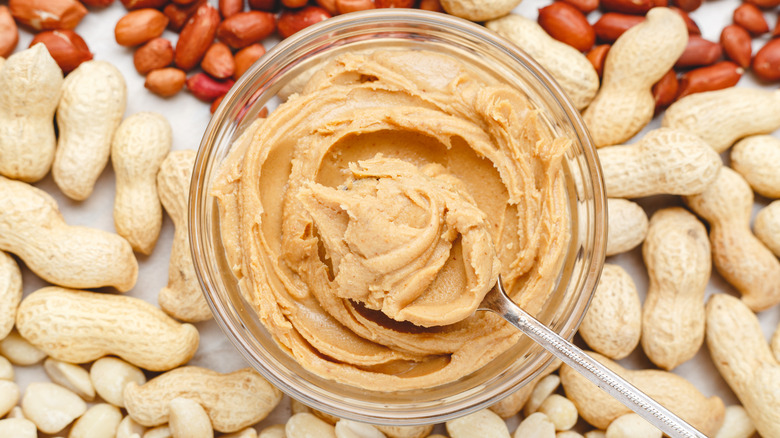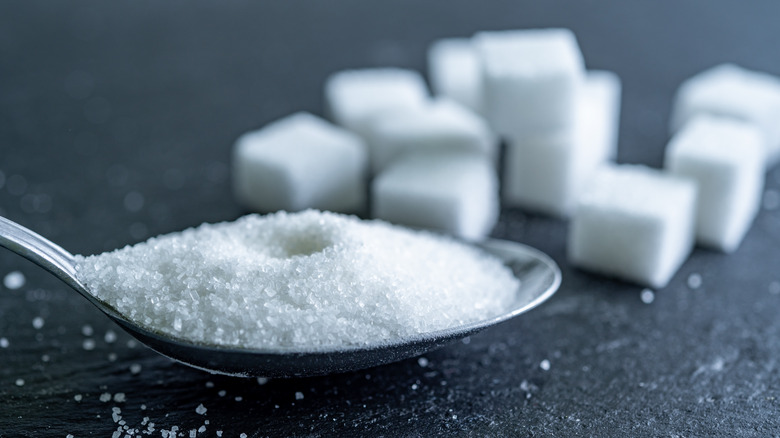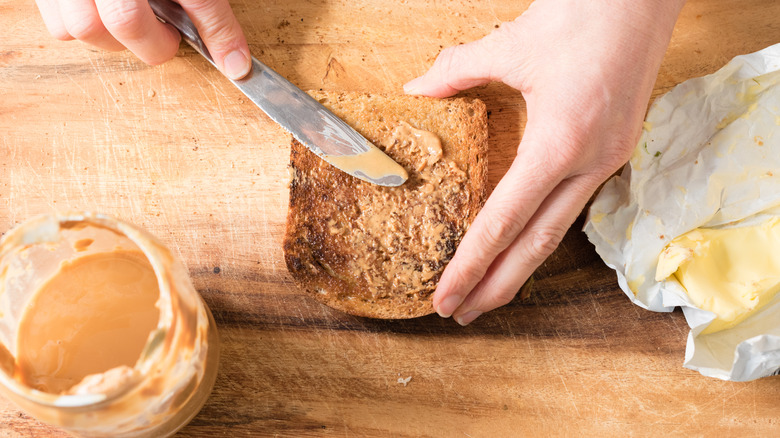The One Ingredient That Shouldn't Be In The Peanut Butter You're Eating
Peanut butter is a favorite choice for kids and grownups alike. Depending on your preferences, you can spread it over toast, mix it into smoothies, or use it as a protein base for oatmeal. This creamy ingredient can also be used in homemade cookies, protein bars, and other quick snacks, but is it really that healthy?
Natural peanut butter only contains two ingredients: peanuts and salt. The latter is optional. Two tablespoons deliver about 190 calories, 8 grams of protein, 7 grams of carbs, and 16 grams of carbs, reports My Food Data. You'll also get 3 grams of fiber and large doses of iron, potassium, and other key nutrients. But not all peanut butter is created equal. "Some brands add sugar, molasses, vegetable oils, and even corn syrup, [which] basically minimize the health value," explains registered dietician nutritionist Keri Gans (via Health).
This delicious treat can be more or less healthy, depending on its nutritional value. Peanuts, the main ingredient, are rich in protein, antioxidants, vitamin E, and monounsaturated fats. Plus, they boast high doses of magnesium, a mineral that supports muscle function. Resveratrol, p-coumaric acid, and other antioxidants in peanut butter may protect against cancer. To reap the benefits, choose a quality brand that uses as few ingredients as possible. With that being said, there is one ingredient you should avoid at all costs when shopping for peanut butter.
Always check the label for hidden sugars
Some peanut butter brands, especially low-fat varieties, have just as much sugar as a chocolate bar. A good example is Smucker's Goober Peanut Butter and Strawberry Stripes, which boasts 22 grams of sugar per serving (via Smucker's). Sure, it tastes great, but it's not the healthiest option. The sugar comes from corn syrup, high fructose corn syrup, dextrose, and strawberry juice. A Twix chocolate bar, by comparison, has 24 grams of added sugar.
This sneaky ingredient may contribute to heart disease, diabetes, and other chronic ailments. For example, a cohort study published in JAMA Internal Medicine identified a strong link between sugar consumption and cardiovascular death. As the researchers note, sugary foods and beverages can also increase blood pressure, triglycerides, bad cholesterol, and inflammation.
The American Heart Association states that men should limit their sugar intake to 9 teaspoons per day. Women, on the other hand, should not exceed six teaspoons of added sugar per day. The World Health Organization suggests limiting sugar consumption to less than 10% of your daily energy intake. If you can go below 5%, that's even better. Each gram of carbohydrates, including simple sugars, provides 4 calories (per the USDA). So, if you're on a 2,000-calorie diet, your sugar intake should not exceed 50 grams (10%) or 25 grams (5%).
The fewer ingredients, the better
Food & Nutrition Magazine recommends choosing a brand that only uses peanuts. A small amount of sodium is fine, too. Natural peanut butter can be a good option, as it's less likely to contain sugar, artificial flavors, and other additives. Generally, it's best to avoid peanut butter brands containing hydrogenated oils, jelly, or artificial sweeteners. Hydrogenated vegetable oils, for example, are rich in trans fat and may put you at risk for heart disease, diabetes, and obesity (via the Environmental Working Group).
As mentioned earlier, reduced-fat peanut butter is often higher in sugar than regular varieties. Manufacturers add sugar and other fillers to compensate for flavor, explains Food & Nutrition Magazine. The Environmental Working Group recommends Smucker's® Organic Natural Peanut Butter, Brad's Organic Smooth Peanut Butter, or CB's Nuts one-ingredient peanut butter. What matters most is to pick a brand that uses as few ingredients as possible.
Better yet, opt for homemade peanut butter. Simply mix two or three cups of roasted peanuts in a food processor, add a pinch of salt, and pour the butter into a jar. Add a scoop of protein powder or a few pieces of dark chocolate for extra flavor and nutrition.



